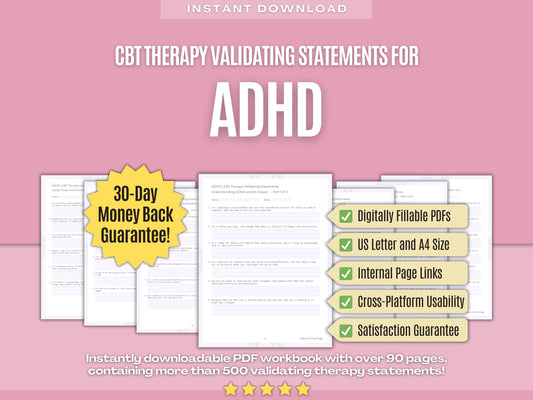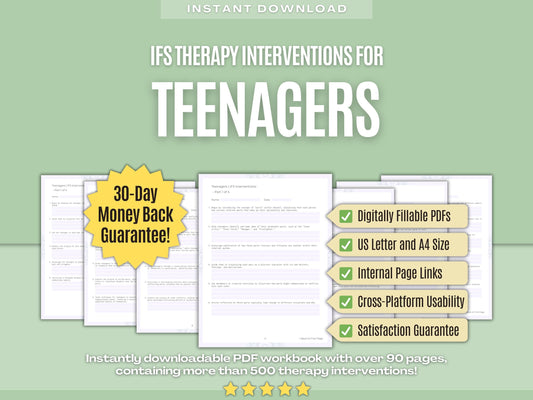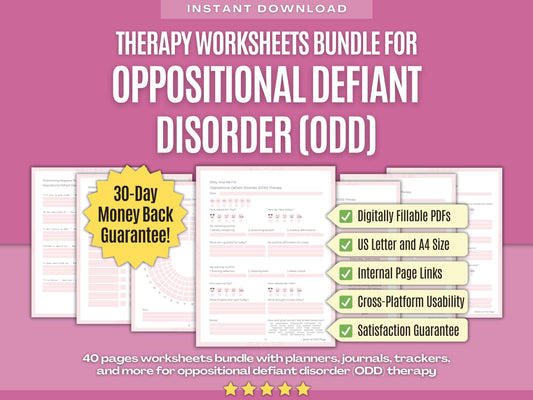Elevate Your Therapy and Guide Your Clients to Inner Healing with Our Social Anxiety Disorder Validating Therapy Statements! ✨
1. Beginning Therapy Sessions
- I want to commend you for taking this step towards addressing your social anxiety by attending these therapy sessions.
- Your willingness to explore and confront your social anxiety is a significant accomplishment in itself.
- Throughout our sessions, I'll be here to listen attentively to your experiences with social anxiety without judgment.
- Your thoughts and feelings about therapy are valid and worthy of exploration.
- Your commitment to attending therapy demonstrates a strong desire for personal growth and healing.
- We'll work collaboratively to identify and address the specific challenges you face in social situations.
- It's important to acknowledge and celebrate even the smallest progress you make in managing your social anxiety.
- Your courage in confronting your social anxiety is truly admirable.
- Your feedback and insights are invaluable in shaping our therapy sessions to meet your needs effectively.
- We'll work towards building a strong therapeutic alliance based on trust, respect, and mutual understanding.
- I'm here to provide you with the guidance and support you need to overcome the challenges posed by social anxiety.
2. Social Anxiety Psychoeducation
- It's important to recognize that social anxiety disorder is a common and treatable mental health condition.
- Understanding the symptoms and triggers of social anxiety can help you better manage and cope with the challenges you face.
- Social anxiety often involves a fear of judgment or negative evaluation in social situations, which can lead to avoidance behaviors.
- Cognitive-behavioral therapy (CBT) is one of the most effective treatments for social anxiety, focusing on changing negative thought patterns and behaviors.
- Mindfulness-based techniques can also be helpful in managing social anxiety by increasing present-moment awareness and reducing reactivity to anxious thoughts.
- Self-help strategies, such as deep breathing exercises, progressive muscle relaxation, and positive self-talk, can complement therapy in managing social anxiety symptoms.
- Social anxiety can impact various areas of life, including work, school, relationships, and overall quality of life.
- Social anxiety disorder is not a character flaw or a sign of weakness; it's a legitimate mental health condition that deserves understanding and support.
- Learning to challenge and reframe negative self-beliefs and assumptions can be a powerful tool in overcoming social anxiety.
- Social anxiety disorder often coexists with other mental health conditions such as depression, generalized anxiety disorder, or panic disorder.
- Setting realistic goals and celebrating small victories along the way can boost your confidence and motivation in managing social anxiety.
3. Mindfulness-Based Interventions
- Let's begin by acknowledging the bravery it takes to explore mindfulness-based interventions for managing social anxiety.
- Your commitment to practicing mindfulness demonstrates a proactive approach to managing the challenges posed by social anxiety.
- It's normal for the mind to wander during mindfulness practice; simply gently redirecting your focus is part of the process.
- By practicing mindfulness, we can develop a greater sense of self-awareness and insight into the patterns of our social anxiety.
- Remember that mindfulness is a skill that takes time and practice to develop; be patient and gentle with yourself as you explore this practice.
- Incorporating mindfulness into your daily routine can help anchor you in the present moment, reducing the grip of anxious thoughts about past or future social interactions.
- Mindfulness encourages us to approach our social anxiety with curiosity and openness, rather than avoidance or resistance.
- Mindfulness can serve as a powerful anchor during moments of social discomfort, helping us ground ourselves in the present moment rather than getting lost in anxious thoughts.
- Mindfulness teaches us to cultivate an attitude of self-compassion, recognizing that we are all deserving of kindness and understanding, especially in the face of challenges like social anxiety.
- Mindfulness can help us develop resilience in the face of social anxiety, allowing us to bounce back more quickly from challenging social situations.
- Mindfulness invites us to bring a sense of curiosity and non-judgment to our experiences, fostering a deeper understanding of our social anxiety.
4. Dialectical Behavior Therapy (DBT) for Social Anxiety
- It's important to recognize that your emotions, including anxiety, are valid and understandable responses to challenging situations.
- Remember that you are not your social anxiety; it's just one aspect of your experience, and it doesn't define your entire identity.
- Embrace the dialectical approach of DBT, which balances acceptance and change, as you work towards managing social anxiety.
- Celebrate your willingness to engage in DBT and explore new strategies for managing social anxiety; every effort you make is a step forward.
- Recognize that setbacks are a natural part of the healing process, and they provide valuable opportunities for learning and growth.
- Understand that DBT offers a toolbox of skills to help you navigate social anxiety, including mindfulness, distress tolerance, emotion regulation, and interpersonal effectiveness.
- Practice distress tolerance skills to cope with overwhelming emotions and urges in social situations, such as deep breathing, self-soothing techniques, or distracting activities.
- Develop interpersonal effectiveness skills to assertively communicate your needs and boundaries in social interactions while maintaining respect for yourself and others.
- Utilize diary cards or journals to track your progress, identify patterns, and celebrate achievements in applying DBT skills to manage social anxiety.
- Practice radical acceptance of yourself and your experiences, acknowledging that while social anxiety is challenging, it's also an opportunity for growth and transformation.
- Experiment with behavioral experiments or exposure exercises to gradually confront feared social situations and build confidence in your ability to cope.
5. Interpersonal Therapy (IPT) for Social Anxiety
- It's completely understandable that you feel anxious in social situations; many people experience similar feelings.
- It takes courage to confront your social anxiety, and I commend you for taking steps to address it.
- Your feelings of nervousness in social settings are real, and it's okay to acknowledge and explore them.
- It's okay to take small steps in social situations; progress doesn't happen overnight, and every step forward counts.
- It's okay to prioritize your well-being and take breaks from social situations when you need them.
- It's okay to set boundaries in social situations to ensure your comfort and safety.
- Your feelings of discomfort in social situations are a natural response, and it's okay to acknowledge them without judgment.
- Your worth is not determined by how others perceive you; you are inherently valuable as you are.
- Remember that everyone has strengths and weaknesses, and it's okay to embrace both sides of yourself.
- It's okay to challenge negative thoughts and beliefs about yourself and your abilities in social situations.
- Your feelings of anxiety are valid, and it's important to find healthy coping mechanisms to manage them.
6. Emotion-Focused Therapy (EFT) for Social Anxiety
- Your emotions surrounding social anxiety are important indicators of your inner experiences, and it's okay to explore them in our sessions.
- Your experiences with social anxiety are valid, and it's important to honor and validate them within the context of our therapeutic work together.
- Your emotions are valuable sources of information about your needs and desires, and it's important to listen to and validate them.
- Your emotional experiences are unique to you, and it's important to explore and understand them within the context of your personal history and upbringing.
- Your emotional experiences are an integral part of your journey toward healing and self-discovery, and it's okay to embrace them with curiosity and openness.
- Your emotions are not something to be feared or avoided but rather embraced as valuable sources of insight and self-awareness.
- Your emotions are complex and multifaceted, and it's okay to explore the different layers and dimensions of your emotional experiences.
- Your emotions are valid expressions of your inner world, and it's important to validate and honor them without judgment or criticism.
- Your emotions are powerful indicators of your needs and desires, and it's important to listen to and honor them with compassion and understanding.
- Your emotional experiences are valid and worthy of exploration, and it's okay to seek support and guidance as you navigate through them.
- Your emotions are an integral part of your self-expression and identity, and it's important to honor and validate them within the context of our therapeutic work together.
7. Psychodynamic Therapy for Social Anxiety
- Your experiences with social anxiety are important indicators of underlying psychological processes, and it's okay to explore them in our sessions.
- Your feelings of discomfort in social situations may be linked to deeper psychological dynamics, and it's okay to explore these in our sessions.
- Your experiences with social anxiety are valid and worthy of validation within the framework of psychodynamic theory.
- Your social anxiety may be a manifestation of deeper psychological conflicts and dynamics, and it's important to approach it with compassion and understanding.
- Your experiences with social anxiety are unique to you, and it's important to explore them within the context of your individual psychology.
- Your social anxiety may be a reflection of deeper conflicts within yourself, and it's important to approach it with empathy and self-compassion.
- Your social anxiety may be a result of internalized beliefs and expectations, and it's important to challenge these in our therapeutic work together.
- Your social anxiety may be rooted in unresolved conflicts between your conscious desires and unconscious fears, and it's important to explore these dynamics in our sessions.
- Your social anxiety may be a result of unconscious fears of rejection or abandonment, and it's important to approach it with empathy and understanding.
- Your social anxiety may be a manifestation of deeper psychological processes, and it's important to approach it with curiosity and openness.
- Your social anxiety may be a result of unconscious conflicts between your conscious desires and societal expectations, and it's important to explore these dynamics in our sessions.
8. Music Therapy for Social Anxiety
- Your experiences with social anxiety are valid, and music therapy offers a unique and powerful way to explore and express these feelings.
- Your feelings of discomfort in social situations can be validated and explored through the creative and therapeutic use of music in our sessions.
- Your experiences with social anxiety are unique to you, and music therapy provides a safe and supportive space for exploring and addressing these challenges.
- Your musical expressions can serve as valuable reflections of your inner world, providing insight into the thoughts and feelings that contribute to your social anxiety.
- Your experiences with social anxiety can be explored and processed through a variety of musical activities, including listening, improvising, composing, and singing.
- Your musical creations are valid and worthy of validation within the context of music therapy, which honors the unique perspectives and experiences of each individual.
- Your experiences with social anxiety can be represented and explored symbolically through the music you create or engage with, allowing for deeper insight and understanding.
- Your musical expressions can serve as powerful tools for processing and integrating difficult emotions, allowing you to gain insight and perspective on your social anxiety.
- Your experiences with social anxiety can be transformed and reframed through the creative process of music-making, allowing you to find new meaning and understanding.
- Your musical creations are unique reflections of your inner world and lived experiences, and it's okay to honor and validate them as such.
- Your experiences with social anxiety can be explored and validated through the therapeutic relationship between you and your music therapist, allowing for deep insight and growth.
9. Wrapping Up Therapy Sessions
- As we come to the end of today's session, I want to acknowledge the courage and effort you've shown in exploring your social anxiety.
- Your commitment to your own growth and well-being is evident, and it's important to honor and validate that commitment.
- Your experiences with social anxiety are valid and worthy of exploration, and it's important to approach them with compassion and understanding.
- Your willingness to engage in therapy and explore solutions is a positive step toward managing your social anxiety and improving your overall well-being.
- Your experiences with social anxiety are unique to you, and it's important to honor and validate them within the context of our therapeutic work together.
- Your commitment to your own growth and healing is inspiring, and it's important to acknowledge and celebrate your progress along the way.
- Your experiences with social anxiety are complex and multifaceted, and it's important to explore and understand them with curiosity and openness.
- Your willingness to explore and challenge negative beliefs and thought patterns is commendable, and it's important to continue to do so with compassion and self-compassion.
- Your experiences with social anxiety are not a reflection of your worth or value as a person, and it's important to approach them with self-compassion and kindness.
- Your experiences with social anxiety are valid and worthy of validation, and it's important to approach them with empathy and understanding.
- Your experiences with social anxiety are just one aspect of your identity, and it's important to recognize and celebrate the many other facets of who you are.
10. Final Session Closure
- As we conclude our final session together, I want to express my deep appreciation for the work you've done and the progress you've made in addressing your social anxiety.
- Your commitment to your own healing and well-being has been evident from the very beginning, and it's been an honor to accompany you on this journey.
- Your experiences with social anxiety are valid and worthy of validation, and it's important to honor and respect the progress you've made, no matter how small it may seem.
- Your willingness to engage in therapy and to explore difficult emotions and experiences is a testament to your strength and resilience, and it's important to acknowledge and celebrate that.
- Your experiences with social anxiety are just one part of your story, and it's important to recognize and celebrate the many other aspects of who you are.
- Your willingness to invest time and energy into your own healing and growth is commendable, and it's important to continue to prioritize your well-being as you move forward.
- Your experiences in therapy have been unique to you, and it's important to honor and respect the insights and growth you've gained along the way.
- Your experiences with social anxiety have provided valuable opportunities for self-discovery and personal growth, and it's important to acknowledge and honor that growth as you move forward.
- Your experiences with social anxiety have not defined you, and it's important to approach this transition with a sense of hope and possibility for the future.
- Your experiences with social anxiety are valid and worthy of validation, and it's important to honor and respect the progress you've made, no matter how small it may seem.
- It's important to approach this transition with openness and curiosity, allowing yourself to embrace the opportunities for growth and change that lie ahead.
We hope that our validating therapy statements for Social Anxiety Disorder therapy will help you to elevate your therapy practice and guide your clients to inner healing! Do you need more validating therapy statements for Social Anxiety Disorder therapy? Find them all in our Digital Workbook! Or do you have any questions or suggestions for us? Please feel free to contact us at any time!


















